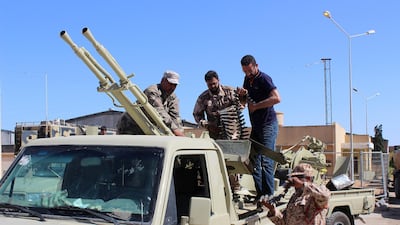The European Union has urged Libya’s warring factions to dissociate themselves from terrorists, war criminals and UN Security Council-sanctioned individuals involved in the fighting near the capital of Tripoli.
A Foreign Affairs Council statement, which called for a ceasefire, also warned that the upsurge in violence risked allowing terror groups to abuse the chaos.
More than 440 people have died and tens of thousands have been displaced, when units from the Libyan National Army and loyal to eastern commander Field Marshal Khalifa Haftar moved on Tripoli a month ago.
The UN-backed Government of National Accord currently holds the capital but it is reliant on an array of battle-hardened brigades from north west Libya to protect it and keep the LNA out.
Militia commander Salah Badi was designated by the UNSC last November and has been seen fighting against the Field Marshal’s brigades.
Badi, from the city of Misrata, was said to have “consistently attempted to undermine a political resolution in Libya through his support for armed resistance”. In a sign of Libya’s constantly changing and often murky alliances, Badi and his Al Samoud front actually attacked GNA forces in Tripoli last year.
A stalwart of the 2011 uprising that ousted former ruler Muammar Qaddafi, Badi sees himself as a bulwark against those trying to alter the revolutionary trajectory.
Another militia leader, Ibrahim Jadhran, appeared to make a statement supporting anti-LNA forces. He was sanctioned by the UN and United States last September for his repeated attacks against Libyan oil facilities over recent years, assaults said to have cost Libya billions of dollars in revenue.
A handful of men from towns west of Tripoli, who are subject to asset freeze’s and travel bans over human trafficking, also seem to be fighting alongside pro-GNA units.
Abdul Rahman Al Milad also known as 'Bija' head up a coastguard in Zawiya "consistently linked with violence against migrants and other human smugglers," according to the UN. He admitted as much in an interview with Reuters last year saying: "Yes I strike migrants and this is so they sit correctly and don't move about."
His allies Omar Al Dabbashi and Mohamed Kachlaf, both sanctioned for their roles in human trafficking and militia leaders themselves, are accused of fighting against the LNA also.
There have also been unconfirmed reports that militants from Ansar Al Sharia and fighters from the Benghazi Defence Brigades, who the LNA regard as a terrorist group, are fighting against Field Marshal Haftar’s forces.
An LNA special forces officer, Mahmoud Al Warfalli, is wanted by the International Criminal Court on war crimes charges but does not seem to have been involved in the Tripoli offensive as of yet.
The EU and UN’s repeated calls for a ceasefire have so far received little traction. The GNA’s prime minister Fayez Serraj has been on a tour of Europe in the last week and held talks with various leaders.
"The LNA military attack on Tripoli and the subsequent escalation in and around the capital constitutes a threat to international peace and security and further threatens the stability of Libya,” the EU statement said.

